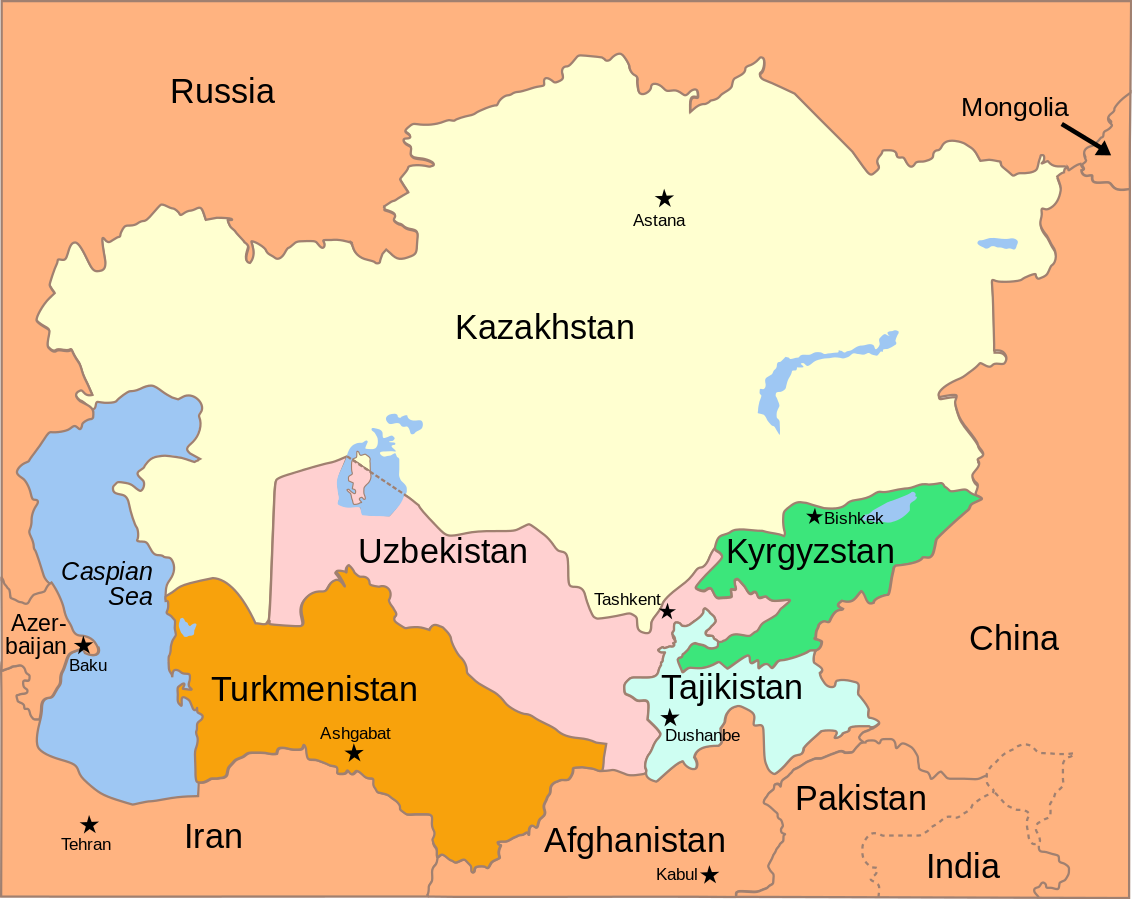Transnational Repression: Central Asia
By Joanna Michalopoulos, Human Rights and Law Intern
Transnational repression is a tool of global authoritarianism that threatens human rights, democratic values, and national security worldwide. While China and Turkey are the two major perpetrators of transnational repression, the governments of Azerbaijan, Kazakhstan, Kyrgyzstan, Tajikistan, Turkmenistan, and Uzbekistan have also used transnational repression against exiles since 2014.

Image courtesy of Themightyquill, is unmodified, and licensed under CC BY-SA 3.0.
In Tajikistan, the government has used security cooperation with Moscow to launch an extensive campaign of transnational repression. In 2022 alone, Tajikistan accounted for 27% of reported global incidents, including detentions, deportations, renditions (a transfer of a person from one country to another), assaults, an unexplained disappearance and one assassination.
Azerbaijan has targeted opposition figures and journalists living abroad since 2014. Freedom House reported five renditions from Ukraine, Georgia and Turkey, with journalists and their spouses being the primary victims. Additionally, in at least two other cases, Azerbaijani authorities have used international notices to detain individuals abroad for further targeting.
Kazakhstan’s transnational repression incidents have mainly targeted political opposition figures and former insiders, especially associates of Mukhtar Ablyazov, a former minister and banking official accused of embezzlement. In one case, activist Murat Tunishbayev was unlawfully deported from Kyrgyzstan to Kazakhstan in 2018, despite having a pending asylum application in Kyrgyzstan.
While evidence of a systematic campaign is less apparent in Kyrgyzstan, Freedom House’s report included five cases, four of which targeted ethnic Uzbeks who fled the country after the 2010 violent riots in southern Kyrgyzstan. They were detained in Russia in 2013 and 2014, but released following legal challenges. The most recent case from Kyrgyzstan involved the detention and immediate return of the husband of a prominent anti-corruption campaigner.
Lastly, leaked documents reveal Turkmenistan’s practice of compiling lists of Turkmen students living abroad and recruiting some to spy on their peers. Their objective is to identify and track the students’ political or religious extracurricular activities. Additionally, authorities subject the families of dissidents living abroad to intimidation and harassment.
Most Central Asian exiles who are experiencing transnational repression from their country of origin are living in Russia and Turkey. Fifty-one of the 111 physical incidents documented by Freedom House in Central Asia occurred in Russia. Additionally, in the last six years, there have been assassinations of exiles from Chechnya, Uzbekistan, and Tajikistan, and renditions of exiles from Azerbaijan and Tajikistan, within Turkey’s borders.
Transnational repression is a grave issue affecting not only the United States, but victims across the globe. It is a growing threat to the rule of law and human rights.
To report these crimes, contact:
- Australia: The Australian Security Intelligence Agency at 1800 123 400
- Canada: The Royal Canadian Mounted Police at https://www.rcmp-grc.gc.ca/detach/en
- New Zealand: New Zealand Security Intelligence Service at https://providinginformation.nzsis.govt.nz/ or by calling 0800 SIS 224 (0800 747 224).
- United Kingdom: The local police on 101. You can also report anonymously to Crimestoppers online or by calling 0800 777 111
- United States: The FBI online at tips.fbi.gov

Updated: August 2023.
References
Yana Gorokhovskaia, and Nate Schenkkan, and Grady Vaughan. “Still Not Safe: Transnational Repression in 2022.” Freedom House, 2022, https://freedomhouse.org/sites/default/files/2023-04/FH_TransnationalRepression2023_0.pdf
Nate Schenkkan, and Isabel Linzer. “Out of Sight, Not out of Reach.” Freedom House, 2022, https://freedomhouse.org/sites/default/files/2021-02/Complete_FH_TransnationalRepressionReport2021_rev020221.pdf
Freedom Now. “Turkmenistan in Brief.” Freedom Now, 2022, https://www.freedom-now.org/wp-content/uploads/Freedom-Now-Turkmenistan-Two-Pager-FINAL.pdf


